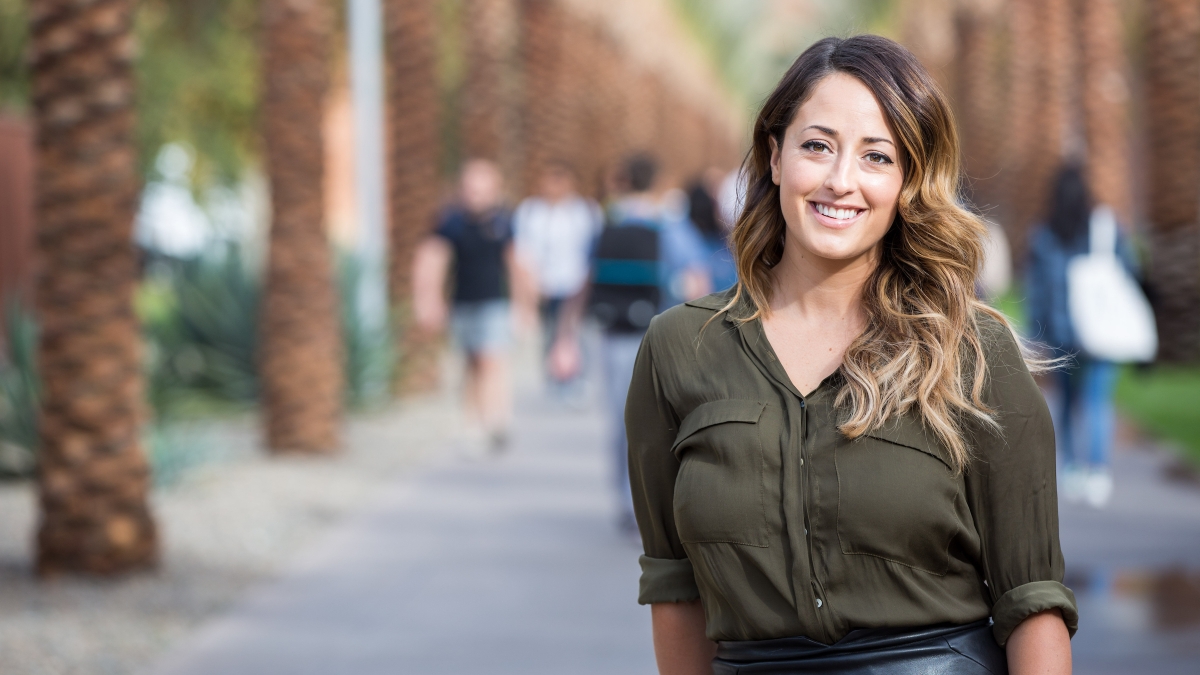Editor’s note: This is part of a series of profiles for fall 2017 commencement. See more graduates here.
One of journalism student Jasmine Spearing-Bowen's early class assignments was to pick up a phone and dial the mother of a convicted murderer to ask about his crimes.
“It was definitely terrifying, but when I finished I could honestly say the story was complete,” said Spearing-Bowen. “As hard as that was, those are the things a reporter has to do to ensure they are presenting the full picture.”
The 30-year-old will go from full picture to full circle when she graduates this month from Arizona State University with a master’s degree in mass communication from the Walter Cronkite School of Journalism and Mass Communication. Fittingly, she has been named the 2017 ASU Alumni Association Outstanding Graduate at Cronkite.
Spearing-Bowen said a year ago when she started her master’s degree, she and members of her cohort were novices who barely knew how to turn on their equipment. A year later she has written several long-form investigative pieces on the criminal justice system, immigration and science. She also traveled to North Carolina, Louisiana and Oklahoma as a News21The Carnegie-Knight News21 program brings together top journalism students from universities across the country to produce in-depth multimedia news projects that cover important issues. The program is headquartered at the Walter Cronkite School of Journalism and Mass Communication at Arizona State University. fellow, working on a national project called Troubled Water as part of a news collective that investigated the state of drinking water in America in 2017.
After her Dec. 11 graduation, Spearing-Bowen will head to Southern California where she will join her husband, Derek, a criminal justice major who also graduates from ASU this month. While there she hopes to gain another journalism fellowship or internship.
“When I look back, it’s amazing to see what I've accomplished,” Spearing-Bowen said. “I’m very proud of what I’ve produced, and my time at Cronkite will help me get a job.”
Question: What was your “aha” moment, when you realized you wanted to study the field you majored in?
Answer: I've always wanted to be a journalist because I think there are so many interesting stories that aren't told, but I didn't feel ready after my undergrad to actually work in the field. During my time at Cronkite I've developed my writing, photography and videography skills so I feel prepared to tell stories in a variety of mediums, and to do it well.
Q: What’s something you learned while at ASU — in the classroom or otherwise — that surprised you, that changed your perspective?
A: I've learned so many things during the last year and a half. One of the best things about journalism is that you get to meet people from all different backgrounds and do things that most people don't get the opportunity to do. In the last six months, I've travelled around the U.S. to learn about water contamination, gone on a ride-along with the Phoenix Police Department, visited a morgue to see organs from an autopsy, attended trials and deportation hearings and walked along the border with a humanitarian aid group that delivers water to migrants crossing the desert, just to name a few things.
Q: Why did you choose ASU?
A: I started my master’s degree while I was living in Hawaii, but my husband, who was in the military at the time, was transferred to California so I wasn't able to finish. I always knew I would finish my master's; I was just waiting for the right place and the right time. We moved to Arizona three years ago and after looking into ASU and learning about the Cronkite School, I knew it was the right decision.
Q: What’s the best piece of advice you’d give to those still in school?
A: Keep pushing yourself in all areas of your life. Keep doing things that you thought you couldn't do. Don't get complacent.
Q: What was your favorite spot on campus, whether for studying, meeting friends or just thinking about life?
A: My favorite spot on campus was the sixth-floor editing bays at Cronkite. It was quiet and remote. I could spend a whole day editing in there without realizing how much time had passed.
Q: What are your plans after graduation?
A: After graduation I'm moving to Southern California. I'm applying for fellowships and internships for 2018, and I plan to continue to work as an investigative journalist.
Q: If someone gave you $40 million to solve one problem on our planet, what would you tackle?
A: I would use it to help fund Alzheimer's research because the number of people who are projected to have the disease by 2050 is astonishing. My grandmother suffered from dementia during the last few years of her life, and it was very difficult for her and for our family.
Top photo: Mass communication graduate Jasmine Spearing-Bowen on the Tempe campus on Nov. 29. Photo by Deanna Dent/ASUNow
More Law, journalism and politics
Can elections results be counted quickly yet reliably?
Election results that are released as quickly as the public demands but are reliable enough to earn wide acceptance may not always be possible.At least that's what a bipartisan panel of elections…
Spring break trip to Hawaiʻi provides insight into Indigenous law
A group of Arizona State University law students spent a week in Hawaiʻi for spring break. And while they did take in some of the sites, sounds and tastes of the tropical destination, the trip…

LA journalists and officials gather to connect and salute fire coverage
Recognition of Los Angeles-area media coverage of the region’s January wildfires was the primary message as hundreds gathered at ASU California Center Broadway for an annual convening of journalists…


